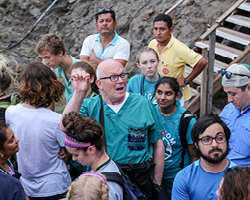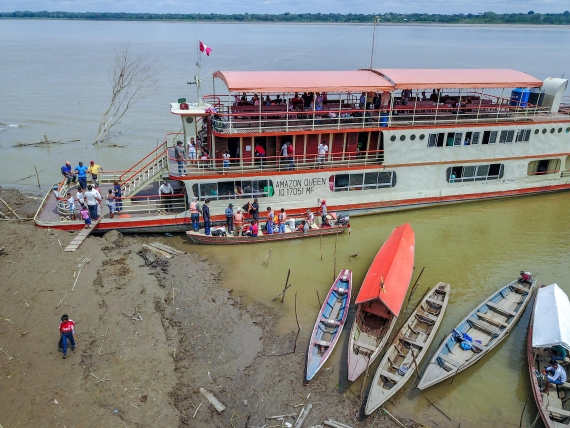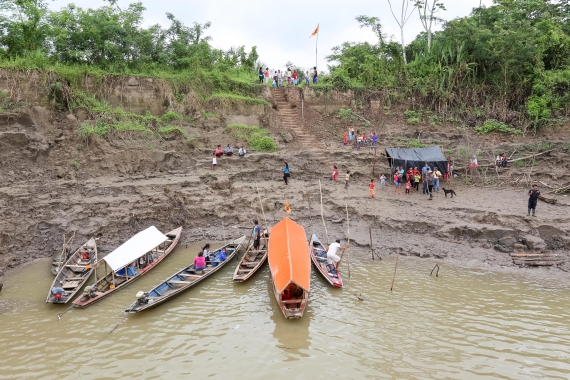Peru, Public Health, and Purpose: Global Outreach Program Offers Valuable Experiences for Future Osteopathic Physicians

"I've saved lives and changed lives through the eyes of my students, and our partners," said Gary Willyerd.
- Gary Willyerd, D.O., FACOEP, FAODME
- Associate Dean, Detroit Medical Center
- College of Osteopathic Medicine
Gary Willyerd knows that diverse experiences lead to more skilled and adept physicians. He leads the Global Outreach Program for the College of Osteopathic Medicine (MSUCOM), recruiting students, physicians, and community partners who provide basic healthcare and education to people in Peru, Guatemala, Cuba, and other places in need.
The program is part of a comprehensive educational experience offered by MSUCOM. Willyerd leads the Detroit campus, and is responsible for educating future osteopathic physicians who will accept responsibility for bringing health and wellness to others.
Osteopathic physicians are trained to look at the whole person and apply a holistic approach to patient care. That includes learning about the patient's lifestyle and community.
Medical Education and Mission Trips to Guatemala

Traveling in a floating clinic on the Amazon River is part of the Peru mission trip experience for MSUCOM students and volunteers.
After graduating from MSUCOM in 1978, Willyerd accepted an internship and residency training at Pontiac Osteopathic Hospital (POH) in Pontiac, Michigan (called McLaren Oakland since 2008), where he became board certified in emergency medicine. Willyerd stayed at POH, applying his strong administrative skills to hospital administration and education. He served as the McLaren Oakland's director of medical education for 18 years. During that time, he organized and participated in 13 medical missions to Guatemala.
Willyerd remained active with MSUCOM as an alumnus, as a faculty member, and as chair of the governing board for the MSUCOM statewide campus system.
Thirty years after graduation, he became the associate dean for the MSUCOM Detroit expansion site. The opening of the Detroit campus proved to be popular, attracting many students because of the convenient geographic location. "We also have quite a few applications by nontraditional students—those who may have families, or it may be their second or third career. Being a little bit of a nontraditional student myself, I enjoy working with these students," said Willyerd.
Growing a Peru Partnership
According to Willyerd, the ground work was already in place for the Peru mission trip when he accepted the associate dean position. "I took the job knowing that it would be one of my first assignments, even though I'd never been there before," he said. The first Peru cohort headed to Lima during Autumn 2009. The 11th trip took place at the beginning of the Fall 2018 semester.
Peru Outreach Program 2009-2018
By the Numbers
Patients Treated: More than 12,000
Dollar Value of Medications and Supplies Delivered: $1.2 Million
Medical Student Alumni: 243
Research Abstracts: 89
"Our primary mission is to provide basic healthcare to a population that gets little or none. It's primary care, but we try to include all aspects of care: dental, vision, obstetrics and gynecology, pediatrics, dermatology, podiatry, internal medicine, and others," said Willyerd. "And also, to give MSUCOM students hands-on experience under the supervision of licensed physicians."
The program partners with physicians who are trained and licensed in Peru. Willyerd and the MSUCOM team work with those Peruvian medical personnel to identify goals and areas of need.
"We have altered locations through the years based on our collaboration with our local partners. Identifying the greatest needs is a top priority," said Willyerd.
After spending four years in the Peruvian highlands, the Peru contacts suggested the MSUCOM contingent should consider traveling to the Peruvian Amazon because of the scarce resources there. They contacted the newly elected mayor and she expressed interest in a meeting.
"We were very surprised when we arrived to a warm welcome at the airport. There was a band greeting us, followed by dinner hosted by the mayor with speeches of gratitude, more music and mandatory dancing," Willyerd said.
The group now journeys to Iquitos, an area in the northern Amazon that was a former industrial hub for rubber. Adela Jiménez was appointed mayor of Iquitos, the largest city in the Peruvian rainforest, in September 2012. She was elected for another four-year term in 2015. The city is the capital of the Loreto region and the Maynas Province, and is also known as the capital of the Peruvian Amazon. As mayor, Jiménez is responsible for administering city services.
"We hit it off right away. She wanted to know how she could get better medical care to her constituents," said Willyerd. "We discussed mobile trailers, and I described them and told her about their uses. After we left that year, she managed to buy three, and hire a physician and medical support people. They are still operating, and they have moved to different parts of Iquitos on a quarterly basis. It's quite a large area and moving them means more people can be served in different quadrants."

Treating patients from the shores of the Amazon River provides essential medical services to areas of greatest need.
In addition to the mayor and the resources her administration marshals, another key partner is the Peruvian Army.
"We stay on an Army base where they treat their soldiers, and we are able to utilize the facilities for our patients. The mayor has a team that cleans, paints, and makes sure the plumbing is in working order for MSUCOM," said Willyerd.
Participants spend time in the army hospital clinic, then provide service in the poorest part of Iquitos before boarding the Amazon Queen. They take this floating clinic 25 miles down the Amazon River to care for people who might not otherwise see a physician.
"We are fortunate to stay in an ecolodge and use the Amazon Queen to set up clinics from the shore of the Amazon. The only healthcare services these people receive require them to travel to Iquitos, where medical resources are difficult to find and costly."
Communicating through an interpreter, Mayor Jiménez said of Willyerd and the MSUCOM team, "We are grateful to them."
Each visit gave Willyerd the opportunities to evaluate and refine the experience for patients, volunteers, students, and benefactors.
"I'm always looking for opportunities—a few times opportunities have fallen into my lap," said Willyerd.
The program has deepened and expanded during the past decade. Willyerd has discovered that the more he networks, the more those different opportunities have cropped up in the most unexpected ways.
"There was a student who went on the trip the second year, and his roommate's father helped support his trip. From there, he became very supportive of our efforts. His son became a teacher and just participated in our most recent Peru trip by bringing 17 high school students from Barcelona to serve as interpreters," said Willyerd.
Early on, fundraising was a part of the student experience to participate in the Peru trip. "This year students raised more than $30,000. We were able to bring medications and supplies that were purchased from that amount, and I negotiated reduced costs. We treated 2,207 patients, and were able to leave what we didn't use with the Peru physicians. Everything we bring is new, with a one-year expiration date, so we hope it all gets utilized," said Willyerd.
When asked what was needed most for the international trips, Willyerd responded, "Everything." He works with a growing list of individuals, businesses, and organizations to recruit volunteers, medications, supplies, and monetary donations. Despite a national healthcare system in Peru, there is a shortage of doctors as well as the financial means to purchase medicine and medical supplies.
Student Research and Public Health in Peru
The annual Peru trips offer students an array of clinical and research experiences. Doctors, surgeons, dentists, and others are needed to meet the challenges of working with underserved people of all ages.
The research is an important component of the Peru mission trip. One example pertains to screenings for cervical cancer, one of the leading causes of cancer deaths among Peruvian women. MSUCOM is a partner in the collection of samples that identify the human papillomavirus (HPV) genotypes. Researchers are working to determine whether the genotypes covered by the Gardasil vaccination are the same genotypes prevalent in Peruvian women diagnosed with cervical cancer. Additionally, MSUCOM is partnering with a hospital to implement a program where women can be screened and receive information about surgical or medical treatments for HPV.
Another critical research project involves water quality among Peruvians living along the Amazon River. Students were introduced to patients with gastrointestinal infections caused by bacteria and parasites. They recognized that treatments would need to be frequent unless residents had access to clean water. MSUCOM partnered with a local NGO to monitor and test water quality, and the research team designed a filter utilizing local resources. The aim is to create a sustainable solution that reduces or prevents water-sourced infections.
The Rotary Club of Traverse City has supported the MSUCOM medical mission to Peru for the past three years.
"MSU participants deliver well-planned and executed medical work, and our Rotary Club members feel this type of project can have the worthwhile impact in Peru that deserves our contributions," said Tom Petzold, a member who sits on the Rotary's World Community Service Committee.
"The team has wisely leveraged other donors and partners based on our regular financial support. This year's addition of water sanitation via the bio-sand filters increases our level of interest significantly, since clean water and water sanitation is a primary area of international engagement by Rotary International as well as the Rotary Club of Traverse City," said Petzold. "We also play a role of helping to increase collaboration between MSUCOM water sanitation team members and Pure Water for the World, an organization that our club and Rotary International have been working with for several years in places like Haiti and Honduras."
Willyerd advocates for all aspects of the program, and draws support from a variety of organizations. In addition to MSUCOM and the Rotary International, he works with the Peace Corps, the Catholic Church, the Church of Latter Day Saints of Jesus Christ, DOCARE International, and the American Osteopathic Association (AOA).
Looking Ahead
During each visit, Willyerd consults with partners to begin planning for the following year. "We are trying to build more and more continuity. Patients are really good—they will bring back the sheets that we give them so we can try to document their history. Our ultimate goal is to build a 'continuity clinic' where we can all have one central place to see patients and store medical records," said Willyerd.
"Right now we are working on a collaboration with the West Virginia College of Osteopathic Medicine. If they go in to Peru in March, and we go in September, that's patient services twice a year instead of once a year," said Willyerd.
There are other discussions in the works, and Willyerd is hopeful about the continuity of care in an area that MSUCOM has focused on for more than a decade. "The Peruvian government does not direct care, but we involve them in what we are doing. We are welcomed in the community, and we receive hugs and thanks continually. People are so warm and appreciative, it's truly touching," said Willyerd.
Three years ago Willyerd received the key to the city from Mayor Jiménez. He is only the second person to receive the honor, the first being the current President of Peru.
Still, it's not the recognition that matters the most to Willyerd. Years ago he was passing a newsstand and saw a cover photo on a prominent national magazine that featured a former student. The man and his wife had volunteered after a major Indonesian tsunami, traveling to offer medical assistance and any other ways they could help.
"I called him up to tell him how proud I was of him," said Willyerd. "He said that his ability to respond to an international call for help was because he had been on a mission trip that I had organized many years ago. That really had a profound effect on me, to think that I helped give someone the skills to go forward and help out like that—to go where the need is, no matter where it is or who it is. In many ways, I've saved lives and changed lives through the eyes of my students, and our partners."
- Written by Carla Hills, University Outreach and Engagement
- Photographs courtesy of Gary Willyerd, MSU College of Osteopathic Medicine